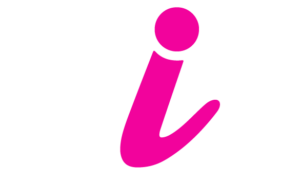#StrongerTogether: Following Your Passions
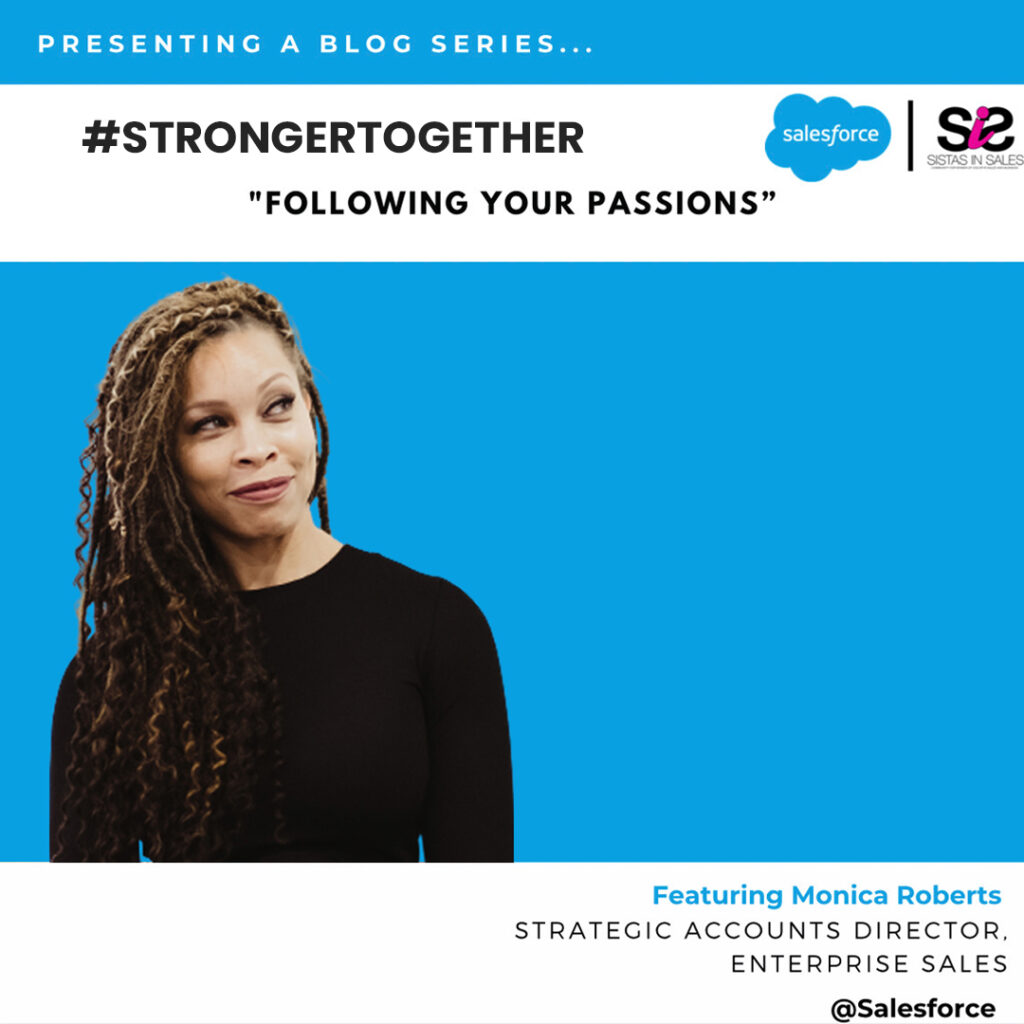
Monica Roberts, Strategic Accounts Director – Enterprise Sales at Salesforce Following her unique combination of talents and inner passions, Monica Roberts started her college journey with pre-med aspirations, ultimately graduating from Baylor with a degree in finance. Continuing a pursuit of medicine because of her love for helping people, she achieved a Master’s in Healthcare Administration. I asked Monica to tell me a little about her sales career, her journey, how she landed at Salesforce, and what advice she would share with others about success in sales. In your college days, you considered a career in medicine. How did you decide to enter the tech industry and how did you pursue a leadership role once there? I’ve taken a path less traveled in comparison to my peers; however, it’s a path that has allowed me to follow common threads of passion for people, process, and change. While pursuing my Master’s degree in Healthcare Administration, I came across an opportunity to be an auditor, which gave me the ability to travel and explore various processes in different departments. This job allowed me to spend time abroad and change scopes of work quickly, but the way I was received as an auditor didn’t really jive with my personality. During this time, I advanced my accounting knowledge through the achievement of an MBA and due to my skill set in process analysis and improvement, I was selected by an IT manager to move into a Business Analyst (BA) role. This is where I was introduced to Salesforce and the value it and its ecosystem bring to the table. Shortly thereafter, I was promoted to IT Service Manager, leading a team of BAs and supporting the entire front office. After that, I joined one of the top consulting firms in the world and was then recruited by Salesforce as a solution engineer. After 3+ years in the role of SE, I made the transition to Strategic Accounts Director. Through many transitions, I availed myself to the possibility of change; however, sales was something that I never set out to do. My passions and hope to drive change, guided me here. I am passionate about Salesforce, passionate about the solutions that we can bring to drive value for my customers, and passionate about my customers. I tell my customers all the time how user-friendly Salesforce is: “This is easy configuration, ‘click not code,’ and if I can figure this out, you can too.” One of the reasons I am enthusiastic about Salesforce is because I understand the benefits from the customers’ perspective. That’s one reason I accepted a role in sales for the company—because I know it works! I like to think that my story could be inspirational to people who are on a certain career path, like finance, and realize, “This is not for me.” I love numbers. I always thought that I was going to be an accountant. I realized the role I was playing in accounting, as an auditor, did not allow me to be seen in the best light by customers as they would hide or shut down when I approached them. It wasn’t a fit with my personality and didn’t really provide the opportunity to be innovative—which my role in sales does. What do you love most about working in sales and what advice would you give to someone considering a career change? Being customer-facing, being innovative, and working with a team are all aspects of sales that I love. Look at what you’re doing now, and consider how the different aspects of your current or past roles are transferable: process, people, interactions, or improvements. Examine how you can transform that into the career that you want. Too often we get stuck in the lane that we’re in and assume it’s the only way that we can go forward. You demonstrate two important traits for success in sales: being open to risk and determination. How do these two traits help you succeed? You certainly must adjust your level of risk aversion in sales because of the compensation model. It’s important to move at a fast pace and pivot on a dime based on customer decisions or changes in the customer’s environment. In my role as a Strategic Accounts Director, I have leadership and coordination responsibilities and also stay on top of customer accounts and am always working to deliver value. I’m incentivized to make a difference in sales. Having that drive and willingness to get up every morning and say, “Okay, I’m willing to dig a little deeper in order to make something happen,” is essential to my success, my team’s success, and my customers’ success. Listen to your customer. Sometimes you get so caught up in the narrative that you are working, but if you’re not listening to your customer, then there’s a total disconnect. You’re wondering why you lost the deal, but much of that hinges on whether you were truly listening and what you were actually listening for. At the end of the day, were you able to respond to their concerns in the right manner? What is the best career advice you ever received? I regularly connect with one of my mentors, Bret Taylor, who is the President and Chief Operating Officer of Salesforce. I recently expressed concerns about being afraid to ask for recognition or compensation. One thing he said was, “Monica, don’t ever apologize for wanting to be compensated for work that you’re doing and for the value you’re bringing to a company.” I responded, “I don’t want you to think that I’m money hungry. I don’t want you to think that I don’t appreciate where I am.” But in that moment, I recognized that as a Black woman, like many others, I had been indoctrinated into this mindset of just appreciating opportunity. That’s why I am proud to work at a company that is committed to equal pay for equal work, conducting an annual audit to account for any potential discrepancies. Another of my
#WantMore: Knowledge Is Power, So Keep Learning

Meet Ranjitha Raghunathan, Commercial Account Executive at GongInterviewed by Florence Madenga “Find your own personal board of directors” On The Pandemic For many people, a global pandemic may look like the worst time to be starting a new job at a new company. For Ranjitha Raghunathan, her first two months at Gong have encompassed some of the best teamwork she’s experienced in a workspace, even without the “space.” At a time where professional relationships are being tested, Ranjitha is thriving. “Obviously we have all been remote and I haven’t met many of them personally,” she says of her team and colleagues. But “they’ve been super helpful. And I think Gong as a tool and a platform itself actually helps me become a better salesperson every day. I couldn’t be happier.” As a commercial account executive, Ranjitha works with smaller companies — this means the size is anything from one employee to 250. The “small and mid-sized business” (SMB) space requires a lot of cold calling, identifying exciting business prospects, and building relationships. It means understanding priorities, fit, and roles — the ones people say they hold, as well as the unspoken concerns, values and responsibilities. While much of this comes naturally to Ranjitha, what made her career transition so painless is that within the first month in her role, she participated in Gong’s mentorship program, which encourages employees to “reach out to anyone to get some help.” She did just that. Ranjitha found herself “leaning a lot on teammates and colleagues” that have quickly turned into friends. She describes this culture as “feedback forward,” a part of the #NoSugar Operating Principle, which fosters an environment where everyone can improve daily and own their own way of selling. Employees are encouraged to be direct, speak their mind, and expect the same from their peers. On Trying Again Ranjitha’s journey to Gong has been two years coming. The first time she applied for a position there, she did not get the job. “I was not qualified by any means to get that job,” she says. But that didn’t mean she stopped. She honed her skills at Salesforce as a new business account executive, and then an SBE account executive, where she consistently outperformed expectations and was a peer-elected team lead. Meanwhile, before she applied a second time at Gong, she combed through much of the content the company was generating, from podcasts and YouTube Video content, to reading more about the industry. “So when they reached out to me, it was a fangirl moment, really,” she says. She breezed through the interview process and found herself at Gong, now as a commercial account executive. Like her arrival to Gong, Rajintha’s arrival to sales has not been linear. It has culminated in journeys across the Atlantic, and interests that she’s gleaned at several other moments in her life. Seven years ago, she moved to the U.S. from India. Prior to that, she was a software engineer, and quickly realized engineering was not something she was passionate about. She then worked for a small wind energy startup where she got into sales, business development, and realized: “Well, it’s like I’ve been doing sales all my life and I just had no idea.” Additionally: “I firmly believe that you don’t technically need to have a title to be in sales,” she says. “I was always selling. You just don’t know what you’re selling, or you could be selling yourself every day.” On Not Selling Out But how do you “sell yourself” without…well, selling yourself? On applying to a sales job (which can be meta because the process itself is an exercise in sales), Ranjitha recommends sticking to who you are. “I think specifically for women of color, it’s important that you own it,” she says “If you’re going to be different, you’re going to sound different. You’re going to look different. And that’s what brings your unique perspective to your job. That’s what makes you stand out and really hone in on those skills.” Here, Ranjitha is speaking from experience. As a brown woman in sales, she has been asked to “tone it down,” to “not be so direct,” so “soften the blow” and adhere to more stereotypical feminized and racialized modes of behavior in the workspace. “I was never a fan of that because that’s not who I am,” she says. “If I was going to take so long to write an email, she says, as has been recommended by some to “tone down” her approach, “the email I’m sending out is really not something I would even say.” So instead of finding another voice, Ranjitha would rather spend time finding her own. “The minute you start imitating someone else, you are going to forget it, you’re going to hate it, and nobody wants that,” she says. “And just to think, you know, the challenges that come with being a woman in sales and in such a male dominated field is a job by itself.” It is because of this reason, and the notion that sales as a career can be “super controlled,” that well-intentioned close friends and family, knowing her personality, warned her not to enter sales. She knew things like “having an accent” and coming from a different country would mean dealing with prejudice. Dealing with this has required having more open and honest conversations around diversity and inclusion. “People don’t realize that we’re not stupid,” Ranjitha says. “Someone says, ‘hey, don’t be in sales.’ Literally, the first question that comes to mind is ‘Why? Do you think I sound different?’ That’s my first question. It’s unfortunate that it’s common, but I think thankfully that times are changing.” On Finding Your Own Personal Board of Directors What has also helped that change is other women supporting each other. “I think people who I admire the most are people who care, like they really really care, and not just say they care,” she says. “There’s a big difference between the two, and people don’t really realize that.”
#WomenOfWonder: You Can’t See What You’re Learning Until You Come Out The Other Side

Meet Andrea Bibbs: Vice President, Ad Sales Marketing & Studio Operations, WarnerMedia GroupWritten by Myrna L. DatilusSpotlight Blogger, SIS Andrea Bibbs is the VP of Ad Sales Marketing & Studio Operations at WarnerMedia Group and has an impressive resume that details exactly how she has worked so diligently over the past two decades to get where she is today. During our conversation I was able to learn how many things we had in common, including our West Indian cultural backgrounds, and how driven Andrea is about getting to the next level in her life both professionally and personally. As teenagers from Guyana, Andrea’s parents moved to London separately, and when they met one another for the first time in the early-’70s, they decided to migrate to Canada together a few years later in the mid’70s. That is where the story of Andrea Harry Bibbs begins. Andrea is a Guyanese- Canadian woman who prides herself on her cultural identity and embraces the values that have been instilled in her from her parents. Andrea is also “a wife and a mother to two amazing young children; my oldest is my 8 yr old daughter Bailey, and my youngest is my 5 yr old son, Braeden.” Since the children were born in the USA, and surrounded by American culture, Andrea and her husband, Trey, find that it’s important that they learn about their Canadian and Guyanese roots and history. “So it’s just, I think, similar to sort of what my parents did. They didn’t want us to lose that piece. And I feel really, it’s funny how life works. It’s like such a circle because I feel like the same thing. I don’t want them to lose that piece of who they are.” Based on all I have learned about Andrea in such a short amount of time, I am sure the children will never lose but only gain more of who they are in this world, just like their mother did. In the first Wonder Woman movie, the love interest of Wonder Woman, Steve, made a strong statement, “It’s not about what you think you deserve, it’s about what you believe,” and it made me ask Andrea about her own life’s values and beliefs. I want to know how exactly they help her to reach the level of success she has in both her personal and professional life, and she simply responds, “One of my core values is leading with kindness. That’s something that my parents would always talk about.” Kindness and an added core value of relationship building is what has helped Andrea remain and thrive at WarnerMedia for about 21 years now. In 1998, Andrea started off as an Intern at CNN at the age of 21, right before graduating from Ryerson University in Toronto, Canada. A year after she graduated, she was offered an opportunity to come back to work for them. “I think that’s something that has never really changed about me. In this business of media and sales, it can be a really cut throat, competitive type business. I just never changed who I was in terms of being kind first of all, being empathetic, but really focusing on relationships and making sure that I was respecting folks just as what I wanted in return.” Andrea prides herself on forging genuine relationships, and not ones based only on ‘what can you do for me? How can you get me ahead?’ Andrea always kept a ‘how can I help you?’ approach with most if not all the relationships she has built throughout this business. Nonetheless, Andrea learned that being a kind, empathetic person doesn’t always go hand in hand with being a leader and moving up the corporate ladder. “I feel like I’ve just always led from a place of trying to be helpful while focusing on the right type of relationships.” This approach may have had her go up the corporate ladder at a slower pace, but by getting to where she is now by remaining true to herself and not stepping on any necks to get there, has helped her to be a true advocate of authenticity & integrity within the sales industry. That one trip to Atlanta right before graduating college, led Andrea in 2000 (2yrs after graduating), to work at CNN/Sports Illustrated as a liaison between their website and on-air shows. She then went on to CNN.com in 2002 as an Associate Producer where she also served as a liaison between the site and shows, as well as working on interactive content for the site. “Working closely with the TV network and the site, again, was through relationships. I’d only been there for like a year and a half, but I think I had forged really great relationships where we kind of knew that something might happen with the network and the person who was then the lead of CNN digital whom, I’ve worked with before, said if anything happens to come find him….as soon as we found out that the network was shutting down, I reached out to him and I got a job there within a couple of weeks.” To prove Andrea’s consistent message of relationship building, a fun fact about her is that almost every single job she has had at Warner Media has been through the relationships she has built these 20 + years that she can hopefully expand a bit more of. Being a people person and genuinely helping people will always keep Andrea at a place of success, because she has proven herself to be time after time again, a very selfless person; and from my own experience, those types of people make it very far in life. Another part of the first Wonder Woman movie which I loved so much, is when Diana realized her own strength while catching her own fall off the side of a building; she recognized one of her superpowers while in that moment and then she became unstoppable. That scene made me wonder, when did Andrea realize her own strength and that she too, was unstoppable? Andrea responded surprisingly by saying, “I’m still trying to find that strength.
#WomenOfWonder: You Are Stronger Than You Believe

Meet Ebony Moore: Vice President, Linear & Digital Account Service, WarnerMediaWritten by Myrna L. DatilusSpotlight Blogger, SIS Ebony Moore is the VP of Linear & Digital Account Service at WarnerMedia Group and has been with the company for the past 26 years. Throughout her time at WMG, Ebony has witnessed the company transition from Turner Media to WarnerMedia Group and is currently going through a reorganization within the company now. “We’ve been going through this transformation and this reorganization as of November last year, so my role has changed a little bit in the last seven to eight months. I now oversee Linear only, Planning and what we call Advanced Audience Solutions, which is basically targeting linear television by trying to reach very specific advertisers so there’s no waste in the impressions that we deliver.” Along the way, Ebony has learned a lot about herself and the business, and during our great conversation, I learned how what she has experienced over the years has shaped her into the wonderful woman she is today. Ebony was born and raised in Philadelphia, PA by parents that instilled in her core values by taking her to church every Sunday, and ensured that she knew the value of education. She graduated with her Bachelors in Communications Media from Indiana University of Pennsylvania, a school that she initially didn’t want to attend, but since she was admitted under a full scholarship, her dad convinced her to give it a try. Her Philly pride continued to permeate off the screen as she speaks highly of where she is from and what drives her to keep succeeding at WMG, but like any story of success, it comes with its challenges, so I became more intrigued about her story the more she shared some of the trials she has faced as a black woman in the media/ad sales world. Since we are remaining with the Wonder Woman theme for this blog series, I chose to ask Ebony similar questions as asked to her colleague and friend, Andrea Bibbs. The love interest of Wonder Woman, Steve, made a strong statement, “It’s not about what you think you deserve, it’s about what you believe,” and it made me also ask Ebony about her own life’s values and beliefs. Ebony shared, “…it’s gotta be faith over fear. Fear is just the unknown, but fear and doubt can kill.” This question allowed Ebony to recall a time or two in her career when her faith was challenged, and she had to be reminded of her values and beliefs. She shared a time when she was being overlooked for a job position because her boss did not want to lose her as an admin and was intentionally blocking her from getting promoted. Ebony states, “I went to the hiring manager and I said, I know you’re interviewing other people, so you’re not going to choose me? What could I have done differently so that I know for the next time?..and he told me you didn’t do anything wrong. He said, your boss wants to keep you. And so that’s why I’m still interviewing. I was like, okay, well, that’s a different conversation.” Ebony took that moment as an opportunity to talk to her boss and told her how much she really wanted this new role as she didn’t want to be a career admin. She asked her boss something I would’ve never thought to ask, “so how can I help you make this transition work for you as well as work for me?” Ebony ended up performing dual jobs for three months while her boss was interviewing replacements, and although Ebony does not agree that it was fair for her to jump through hoops to secure her next role, she thinks that it “builds a fortitude in my need to speak up or just sit back and let things happen to you.” Due to this situation, Ebony found her voice, and she emphasizes, “You have to have the courage over your convictions…it’s just faith over fear, reminding myself that God’s got it, even when I stumble, even when I fall, and even when I veer off the path that He has set for me…, He’s still walking beside me. He’s still got me.” WOW. You wouldn’t know it if you saw her, but Ebony turned 50 this year. She recalls saying to herself what most of us say as we approach a milestone age, “I’m going to have it all together. I’m going to have it all figured out,” but Ebony quickly realized that what is constant in life is change and opportunity for growth, and she has come to terms with that. She also posed a question that I am still pondering on, “Imagine if you just got to a place in life where you’ve just arrived?” My question after that is, ‘then what?’ Exactly. I segued into referencing when Diana“Wonder Woman,” found her strength; I needed to know when that moment happened for Ebony. She shared that she found that moment at a low point in her career. “One of my employees had doctored an invoice that went to an agency. She literally sat with paper, scissors, tape, and cut out units to put them on an invoice to show an agency that units had aired that had not aired. I got blamed for it. Somehow it came out at the end of the story that I knew that she was doing this, that I sanctioned her doing this, that I gave her the green light to do this, which of course is not true and completely made up.” I had to ask if the woman who fabricated everything was a white woman, and as you may have guessed, she was. Due to this incident, Ebony, her business practice, and her expenses got audited, people around her were being interviewed, and the whole premise of this was really to dig up dirt on her and to figure out a way to terminate her. “I just remember the intense scrutiny that I was being audited and that I just didn’t want to be at Turner anymore.” Ebony says she remembers
#OpenForDelivery: There’s No Success Without Really Loving What You Do
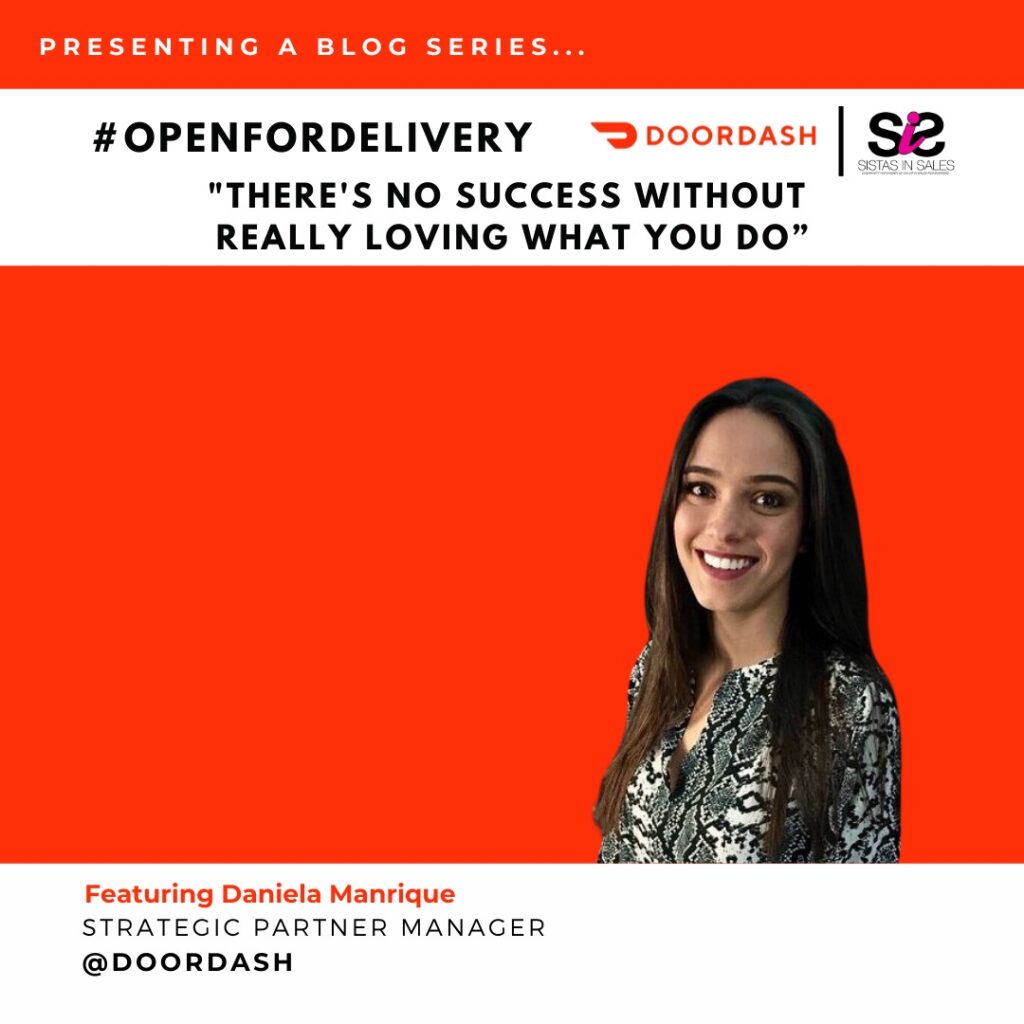
Meet Daniela Manrique: Strategic Partner Manager, DoorDashWritten by: Myrna L. DatilusSpotlight Blogger, SIS Daniela Manrique is a Strategic Partner Manager (SPM) at DoorDash in Miami, and is ecstatic to work for a company that has allowed her to evolve both personally and professionally. In the interview process for DoorDash, Daniela felt that she was being introduced to a company that will celebrate her and her Hispanic background, she also felt confident in knowing that she would be affiliated with a company that encourages her to be herself and share her voice. “I’ve never felt like they’ve gone back on their word,” and for these reasons alone, Daniela is extremely excited about her career at Doordash, so let’s take a few steps back to learn more about who exactly Ms. Manrique truly is. Daniela “Dani” Manrique (Man-Ree-Kay) was born and partially raised in Venezuela, and then in Brazil due to her father’s work requiring the family to travel often. From Brazil, the Manrique family moved to Miami, Florida, where they have been for the past 20 years. She attended and graduated with her Bachelors in Marketing & PR from the University of Florida, with that being the furthest she has ever been away from her family in Miami. Due to her travels, Daniela speaks four different languages (English, Spanish, Portugese, and French), and has an appreciation for many different cultures and people. Being so culturally & educationally sound has allowed Dani to have a general passion for people by helping, building and maintaining relationships with the people she encounters in her life. The trend I have found by spotlighting these amazing women, is that just like me, we are all passionate about the human experience and how we can help leave each person we meet better than how they were. Although her degree in Marketing & PR is not aligned with her current career in sales, Dani says while working at different companies, she has been inspired to continue her work within the sales industry since she has a natural knack in connecting with people. Prior to bringing her talents to Doordash, Dani worked as a sales intern for Cartier at their Latin American headquarters in Miami for their Latin American Caribbean department. Although that position did not require a lot of client facing opportunities, there were moments where if her managers were out or if she needed to hop on a call with a partner, she would get the chance to help them resolve problems, troubleshoot, or just strategize, which required her to interact with her clients more than usual. Those moments proved to be Dani’s favorites because she was able to do what she loved to do the most, which was to talk, and that is where she really found her passion in building relationships and realized that she wanted to continue to do this on a larger yet impactful scale. Dani has another passion for volunteering her time within her community and she began to realize that she desired a role that would fuse everything that she loved together. She yearned to be able to interact and build relationships with people in her local Hispanic community in Miami; a position that would allow her to help support Hispanic small business owners such as the local restaurant owners. She wanted to also support women or anyone that was from any different culture to help grow and scale their businesses. “I actually started working for Ubereats as an Account Manager, where I was able to really dive deep into that passion of mine, of being able to build relationships, being able to help businesses grow and see the impact that I’m making directly with my merchants and my partners.” She worked in that role for two years as the company started growing pretty quickly, then the pandemic hit, and unfortunately things started changing. DoorDash then reached out to Dani informing her that they were growing their team in Miami, and asked her if this was something that would interest her. “At the time I was very interested in Doordash because of all the things that they were doing for the community and for the restaurants during the pandemic. They were going above and beyond to help everybody and that really resonated with what I was looking for in a company and I liked that they shared my values.” Accepting the offer to work at DoorDash was a no brainer for Dani because she will get to continue what she was doing and what she loves to do at a company that shares the exact values and morals that she does. “I applied and now I’m here…I have finally found a place where I belong and am doing something that truly makes me happy by helping local communities and small businesses.” Dani is truly getting the best of both worlds in her position as a SPM. As a SPM, Dani has a book of business where she manages around 30 accounts, “If I manage a Cheesecake Factory, that account is one local business in the market of Florida, that can be anywhere from South Florida all the way to North Florida. I’m equipped to help them grow their business in whatever capacity that means if that’s helping them with marketing campaigns, social media campaigns, product adoption, talking through, and if they have any issues with operations, I am a support for that as well. Right now with the pandemic, we’ve also been focusing on how we can help them just outside of the platform.” Dani elaborates further by sharing that her team goes even further in helping these local businesses figure out how to find people to work at their restaurants! I have never heard of a tech sales team doing that for any of their accounts, so I was truly impressed to learn that DoorDash goes above and beyond for their clients in such a way. “We sometimes will donate money to help them staff people. I do really cool campaigns with them, like if they want to do a social media campaign, I can
#OpenForDelivery: If Not Now, Then When
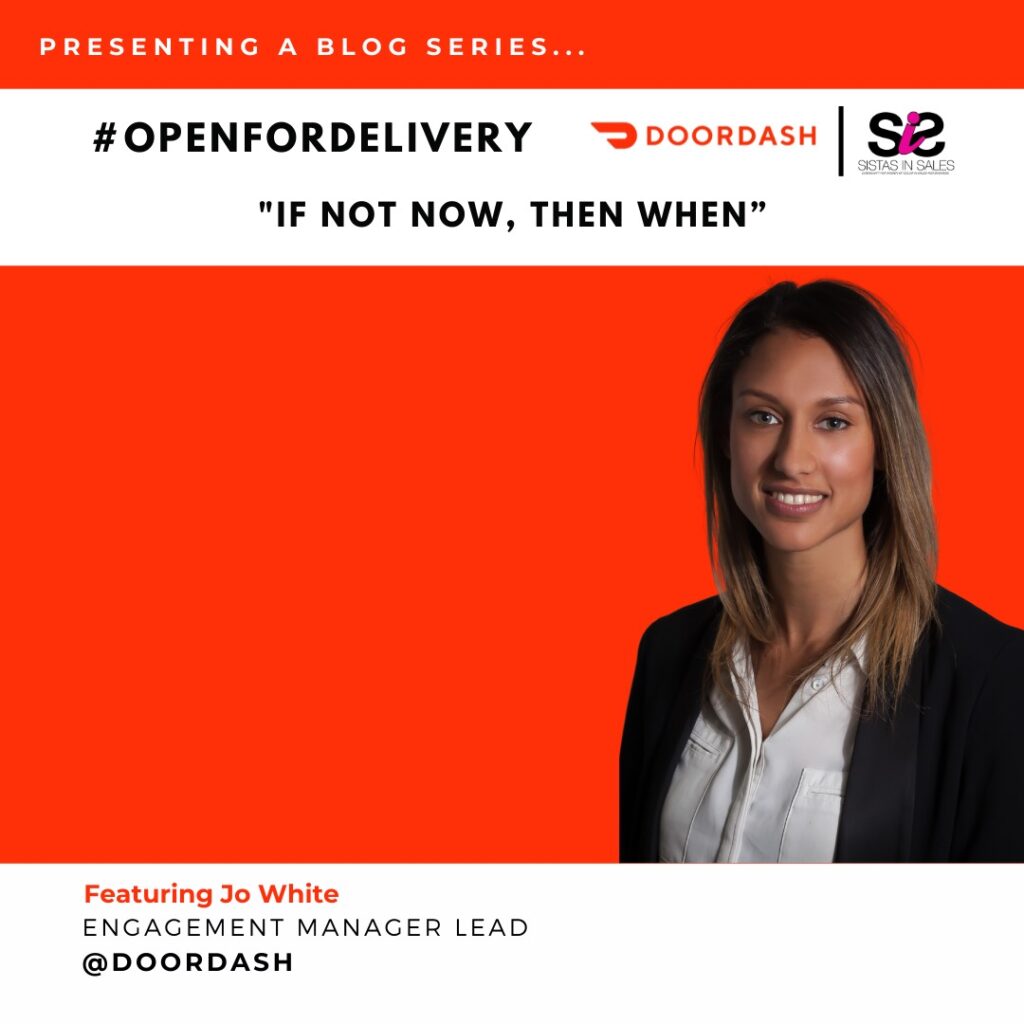
Meet Jo White: Engagement Manager Lead, DoorDashWritten by: Myrna L. Datilus, Spotlight Blogger, SIS Jo White (Joanna White on Linkedin) is the Engagement Manager Lead at Doordash and I am ecstatic to share the additional layers of who she is. During our conversation I was able to learn some things that truly exemplifies how passionate Jo is about her life and her career. Jo was born and raised in London, to a South African mother and an English father. She has always traveled between South Africa and the UK to remain in contact with her cultural roots, and it was very important for her mother to expose her to the South African side of her family. When she would go on “holiday,” in South Africa which translates to “vacation,” her mother would encourage her to go to school with her South African cousins. “It was really important to her for me to know the different cultures and really experience them,” this helped to shape Jo into who she is today with that type of cultural grounding and competency. While getting to know Jo, she made it extremely clear that her value system consists of family first, loyalty, and being very goal oriented. Since she is very close with her family, and she values their opinion. Jo studied Economics at University of Bath in England, and when she graduated, she decided to venture to New York, which ties in her love of traveling. “I’ve always been passionate about experiencing new things and putting myself outside my comfort zone,” and her move to New York did just that. She came to New York and worked a job in Banking as a Business Manager on the sales and trading floor. This position helped to inform some of the decisions Jo was able to make for her next career move within the sales industry. Jo’s face lights up each time she speaks of family and traveling, especially New York City which she states is, “an amazing place…I absolutely loved it.” It was great to also discover that while working in NYC for 14 months, Jo was actually living in Hoboken, NJ, so she was able to enjoy the best of both worlds and truly immerse herself into the NY Metro culture. Despite how much she loves New York, moving back is not something she thinks she would do as she has found solace in Canada. Jo states,“I’m at a stage right now in my life where I’ve found a good balance between an outdoorsy lifestyle with mountains and hiking, coupled with a slight city lifestyle through working in downtown Vancouver. So probably not, but I’ll always go back and visit; I will always think of New York with such fun memories.” Sounds like Jo found a good balance between finding her peace, fun, and career, at home in the UK, NYC, and now Vancouver. Jo’s prior role in Banking, then Strategy Consulting, and as a National Account Manager at Kraft Heinz all helped to set her up with the professional tools needed for her to be successful at DoorDash. While working as the Business Banking Manager, she took notice of how her colleagues interacted with clients over the phones, and how they were able to interact face to face which made her realize that her personality really felt more in line with a client facing role. She found what they were doing to be really exciting and fast paced with very measurable goals, which profoundly resonated with her since she already possesses a competitive spirit. Despite carrying the necessary qualities to succeed in sales, I was shocked to learn that Jo never really viewed herself as a salesperson, which she knows sounds kind of strange. Whether it sounds that way or not, I can totally relate as I felt the same way before working within the sales industry; I believe while working in sales, that is when you realize if you were truly meant to be a salesperson or not. I asked Jo how she got the opportunity to be an Engagement Manager Lead at Doordash, and she first explained what her responsibilities are in her current role,“I look after some of our largest national partnerships in Canada personally, but I also look after one of our two post-sale teams under our Canadian Enterprise branch,” which sounds like a very demanding yet rewarding role. Yet, Jo’s journey to working at Doordash is quite an interesting one. Jo and her Partner who lived in London felt like they were on a “hamster wheel” while working these fast paced jobs with crazy working hours, so they applied and received their visas, “and we thought, you know, if not now then when, so we quit our jobs in London and jumped on a plane to Vancouver. Everyone told us we were crazy, and my boss at the time told me I was committing career suicide,” but that didn’t stop Jo. She actually moved to Vancouver with her Partner after doing a 3month road trip around the US…Wow! The fact that Jo was audacious enough to test her faith like that, should already let us know how fearless a person she is in and out of work. As anyone could assume, this decision came with some strong, yet shocking reactions from Jo’s peers. She shared that she had one group of people essentially thinking that she was making a crazy decision, and another group cheering her on and even confessing that they are jealous of her bold move and have always wanted to do that as well; goes to show you never know who you may be inspiring. Jo never heard of DoorDash before, until she fell upon the company while doing her job search. She found her first role as a Strategic Partner Manager (SPM), an Account Manager type role, which fit very nicely for her. She said during the interview process, “everyone seemed super driven, were really engaged with the overall mission of DoorDash as a company, just really smart people.” She kicked off her DoorDash career as a SPM for about four months, then worked her way into
#BreakIntoTechSales: Executive Leadership—The Path to the C-Suite
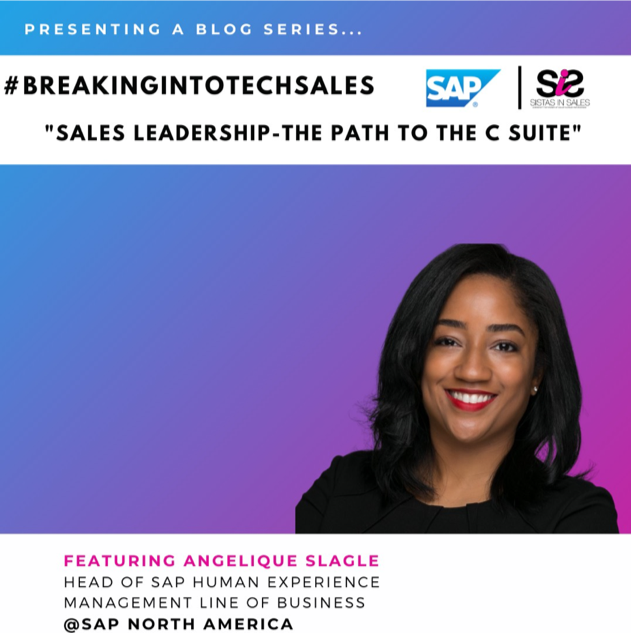
Angelique SlagleHead of SAP Human Experience Management Line of BusinessSAP North America I had the opportunity to interview Angelique Slagle, head of SAP SuccessFactors. Angelique is the highest-ranking Black executive at SAP and has profit and loss (P&L) responsibility. SuccessFactors is a world-leading provider of cloud human experience management, one of the fastest-growing areas in human resources. Angelique leveraged her unique skills to navigate her career from being an administrative assistant to managing a large national sales team for a solution product used by 43 percent of Fortune 500 companies, with 160 million end users in 42 languages. Q: What drew you to being a sales leader? A: I’ve always thought sales was a glamorous position. When I first went to IBM, I started out as an administrative assistant. After about a year, they moved me into a position as junior project manager and then eventually as project manager. I remember seeing these guys come into the office, and they were in their suits and drove Mercedes, and I wondered, “Who are they?” From my perspective, they just came and talked for a couple of minutes and walked out—I was the one taking all the notes and doing the work. I said to myself, “Who are these people, and how do I get on that success track?” Angelique shared that one of the keys to success as a sales executive is good decision-making. Critical Thinking Critical thinking is an essential skill, and yet, as sales professionals, we tend to accept the first proposed solution. Take time to evaluate a topic from all sides. Improving your critical thinking will pay off with improved solutions, better client relationships, and increased sales. Q: Can you tell me more about how critical thinking leads to executive presence? Women, more particularly women of color, tend to lack dominant presence in the workplace. When we walk into a room, we don’t tend to command attention, and we’re not naturally assumed to be leaders or sales executives. We really must spend more time developing the ability to read and lead a room, understanding where people are, and figuring out how to bring them with us or get them to rally behind us. I think that kind of critical thinking skill set is something we naturally have in our DNA. We need to understand the psychology of the people we’re interacting with and then assess the situation while maintaining a highly professional presence. We already do so much of that work in our daily lives- we’ve mastered it professionally far better than our male counterparts. Cultivating Executive Presence Q: You have great executive presence. I have been admiring how this shows up in everything you do. How can women sharpen their executive presence skills to become sales leaders? It starts with having a positive mindset. Executive presence means you project self-confidence, approach unpredictable and difficult situations with calm and ease, and deal with conflict rather than avoid it while looking for an opportunity for growth or to demonstrate your executive presence. To achieve this, you must believe in yourself, and the impact and value you will bring to any room, team or company. Gaining P&L Responsibility and C-Suite Access There is a clear moral argument for increased diversity in top sales management. A recent HRB article indicates companies with more women in executive roles experience many benefits, including increased profitability, improved social responsibility, and the ability to provide higher-quality customer experiences. Ursula Barnes, former CEO of Xerox, was interviewed in 2017 about the lack of Black women in the C-suite. “HR isn’t going to get you there,” said Barnes. “Communications and the arts aren’t going to get you there.” The juice lies with people who are close to the product and the money. Barnes shared a critical tip: Taking a role that has P&L responsibility is a key responsibility for executive sales leadership. Having P&L responsibility involves running a business unit. You are responsible for driving revenue and managing all expenses—maximizing revenue and minimizing expenses to make a profit. Having a seat at the C-suite table as a sales leader requires a job that directly affects the company’s bottom line. Strategies for Successful Sales Leadership Q: How can women of color get into the C-suite or run a line of business? There are three things we can do to move into sales leadership. First, develop financial fluency and an ownership mentality. Seek out roles with P&L responsibility, be an innovator, position yourself as a strong organizational change agent, challenge the industry status quo, and be an industry disruptor. Second, think strategically and create a sense of direction. Ensure every team member is invested in driving revenue growth and improving the company’s financial situation. Develop the confidence and determination to identify savings and growth opportunities and to execute your ideas. Third, embrace your uniqueness. See your worth; don’t wait until someone acknowledges it for you. Q: What’s one thing women can do to help themselves on this pathway? Find a sponsor. Be visible. Sign up for something that puts you in the limelight, like finding a stretch assignment, booking a speaking engagement, executive sponsor an Employee Resource Group. Become a mentor—find and sponsor someone in the organization who you think could benefit from your skill set. And stay in the know. In the morning, I used to listen to music while starting my day until a mentor told me to use my time more wisely. Instead of listening to music, I now listen to a podcast or audiobook. I take what I am learning from those recordings and apply them to either the business I am running or my life. Q: In hindsight, what would you do differently? I would have demanded more for myself earlier on. From a compensation perspective, I was unknowingly the lowest-paid person on my team for several years. I would have changed that. I would have demanded to have more strategic accounts. When I first started, I was told you start at the bottom of the ladder and work your way up,
#BreakingIntoTechSales – From Business Leader to Tech Sales
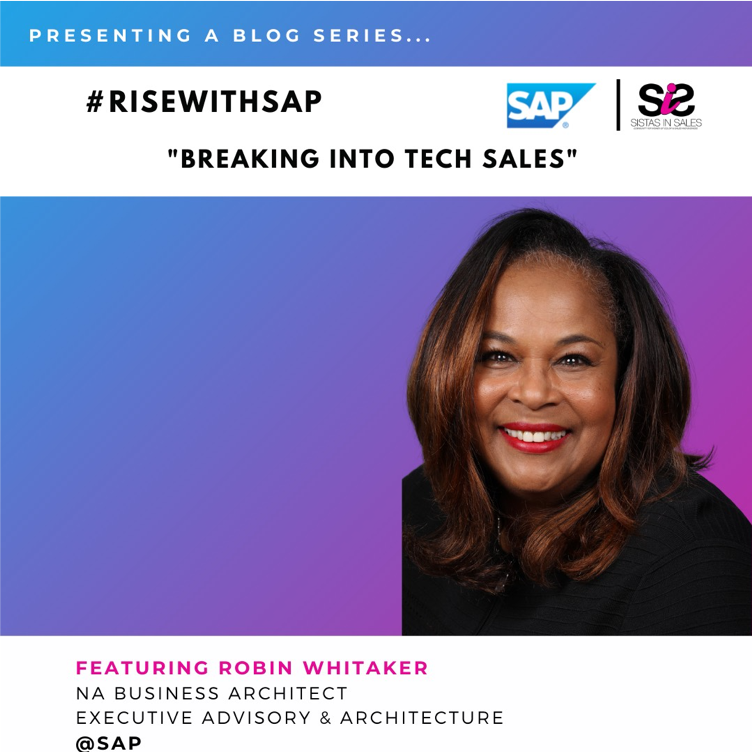
Robin Whitaker, NA Business Architect Executive Advisory & Architecture at SAP Success Leaves Clues Robin Whitaker, NA Business Architect Executive Advisory & Architecture at SAP, is an inspirational, dynamic, elegant and articulate sales leader. Robin started her career path on the business side and not software as many do. Robin worked hard to master her knowledge of corporate industry and is valued for her ability to help businesses transform. From Business Leader to Tech Sales Leader Transitioning into sales for me was easy because I understood the perspective of the customer. You have many customers in sales. Your internal customer can be a member of the internal team that you’re supporting; specifically, the person responsible for the account. And of course, you have your external customer which is the entity you are trying to sell your products and/or services. I think it’s especially important when you move into a sales role that you always keep your customer and the customer’s customers in mind as you develop your strategy. Customer line of sight ensures your strategy will be impactful which brings credibility for you. This way, your customer knows that you not only know them, but you know what’s important to them. That’s how you build the relationship that is pivotal to your success. I was introduced to SAP as a Sr. Business Analyst, responsible for driving best commercial business practices for logistics and transportation. The customer was the US Army Materiel Command. They recognized that they were struggling with logistics in theater. This was an initiative that was sparked by Al Gore called the “Wholesale Logistics Modernization Program”. I was brought on board to introduce the US Army to best commercial practices. I modeled their current business processes by documenting what they were doing and how. Then I provided them with a forward-looking business model and a roadmap to where they wanted to be. Back then, we called it Business Process Re-Engineering and Analysis. It represented process improvements for the customer. Once we re-engineered the customer’s business model, then the question was, “What software would be needed to meet the new and improved business model?” And at that time, SAP was one of the software companies that had been selected. That’s how I was introduced to SAP. With my career progression, each role catapulted me to the next role. And what I liked about it was that each stretch was a split. I had deep expertise for 75% of the role, but I had to stretch my skillset another 25% as a growth and development opportunity. Don’t feel that you must know everything about a role you are pursuing. Look at it as a development opportunity. There are certain aspects of the role where you’ll be great, you bring significant value, but you also need to grow and develop in your career path as well. “Because you are worth it” Best Career Advice I would say the best career advice I’ve ever received was from my Mom. When I started my career back in the early 70’s, the environment was not what it is today. I had to overcome many challenges and basically her advice to me was to stay laser-focused on my life goals and my purpose, and not allow anything or anyone else to disrupt that focus. Whatever my central target was, whatever my reasons for doing what I’m doing, keep my eye on the prize and never feel that there’s anything that I can’t accomplish. As a lesson learned, if I could go back, I would have completed my formal education sooner. That said, every step you take in life leads you to your next adventure. And I am happy where I am today, so I don’t really have any regrets. When you change, that means everything else changes. Embrace the change with no regrets. How to Grow into a Tech Role Final Words… I would also tell women, be patient and know your worth. The number of women in sales that look like us may not be as plentiful as I would like it to be, but it’s not what it was when I first joined the organization. So, obviously we are an organization that’s moving in the right direction. We have different resources such as the SAP Black Employee Network. Stay connected to the network. It’s a haven, a safe place where you can be yourself and network with others who have a alliance with you. Keep striving and you will reach your goals. To all my Sista’s In Sales: “Remember who you are and that you have an audience of one to please in life! Always be your true and best self!” So you want to get a job in tech sales? Excellent! Join us as the panelist of Tech Sales Professionals explain how to go about getting a tech sales job, even if you lack experience. This event is a panel discussion that will detail how women of color can market themselves for tech sales positions when their sales experience is not in the tech field. Attendees will also learn the different areas of SAP that showcase the various sales roles across the company. – CherilynnChief Learning Officer, SISWATCH THE RECORDING Cherilynn Castleman, Global Sales Keynote Speaker/Trainer/Executive Coach, has been a sales executive for 20+ years. With her natural talent for teaching and a drive to sell, Cherilynn uses her skills to coach and train other executives and sales professionals. Author of What’s In the CARDS? 5 Post Pandemic Sales Strategies. Sistas in Sales, LLC (SIS) is a community for women of color sales professionals to network, advance their careers and most importantly, find sisterhood – offering events, thriving Slack community with companies hiring now, and career coaching services. Learn more about Sistas In Sales membership here, connect with us on LinkedIn, Instagram, Facebook, and Twitter. Sponsored by SAP Learn more about SAP here! Sign up for job alerts
#LevelUp Your Sales Career: Finding and Leveraging Your Sales Superpower
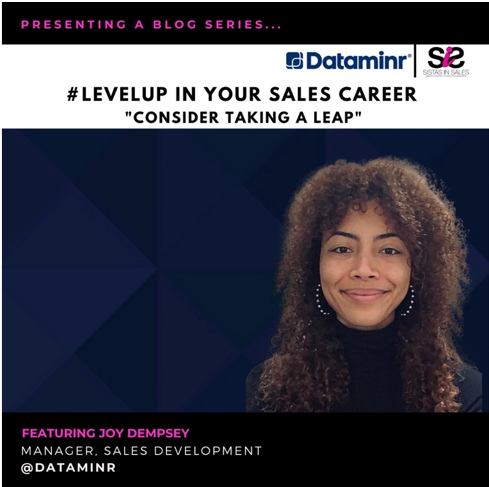
Like many people, Joy Dempsey fell into sales. After studying English at Oxford University and an early career as a police officer, Joy transitioned to sales development. Joy was motivated to become a police officer because she wanted to make a difference in her community. As a police officer, people sometimes saw the uniform and not Joy. Not the empathetic, kind, and driven woman that she is. However, Joy’s empathy, one of her sales superpowers, has been critical for her success in sales. “I had zero sales experience going in and I really didn’t know much about it as an industry. In my experience, people from sales don’t come to career fairs and say ‘come and get into sales.’ Sales sometimes slips under the radar. Making the leap feeling quite uninformed was difficult, but I’m so glad that I did it because I found a career that I absolutely adore.” Currently, Joy is a Manager of Sales Development at Dataminr. Joy attributes her success to believing in herself, having the support of good leaders, and acting with conviction, empathy, and confidence. I asked Joy, what skills do you need to level up in order to become a sales development manager? “You are absolutely good enough. More than that, you are better than good enough…” Be Yourself Maybe it’s silly, but I worried so much about my hair coming into a sales role. I’m just so conscious that my hair is so big. And then with the pandemic this past year, people have had two schools of thought about what working online has done for equality. In a video conference, everyone is just a face and you take up the same amount of space on the screen. As a result, I’ve started to believe myself that my hair is professional, ‘I’ve come to feel comfortable in the fact that natural Black hair is professional too’. This is my natural hair, washed and clean, and this is what it looks like. One of my pieces of advice is don’t change what you look like in order to fit in. ‘One of my pieces of advice is your work, (not your hair!), is the measure of whether or not you fit in – energy spent worrying about what people think of your hair can be better spent doing the job’ “I want to say: you are absolutely good enough. More than that, you are better than good enough. And if you work hard, you deserve to be in the room that you’re in. Even if you don’t look like anyone else, you deserve to be there.” I think what successful SDRs do well is show that they are enthusiastic. As a hiring manager, I don’t prioritize experience. I prioritize enthusiasm and an ability to communicate. And another thing is just honesty and integrity. Just being honest about who you are, because when you’re working in sales development, you’re trying to connect with other people. And you can’t do that successfully if you’re pretending to be something that you’re not. Just be authentic. Creativity I wanted to be a manager because I really love competition, hitting targets, and being successful. But I realized when I was an SDR, I needed that element of helping others to really feel fulfilled. So, I thought, this mentality around competition and achievement could really work well in a management position. I will say that being an SDR and managing a team of SDRs takes a lot of different skills: coaching people, supporting people, and letting them try out those things. And it’s hard because you shift from doing one role to doing a very different role at times. You don’t just want to be that manager that’s always right. Being an SDR is about being creative and standing out. And it’s not just about replicating exactly what your manager has done in the past. The pandemic has really taught us that a multi-tiered approach to prospecting is always the best way. SDRs may have relied heavily on mobile phone numbers to contact people before the pandemic. Now, they have to pivot to email or to LinkedIn. And so just having a presence across all the platforms is the best way to be successful in sales development. About Joy Joy is training for her first triathlon in July 2021 and her experience summarizes her keys to career success: “I have an incredible triathlon coach who she is all about getting women of color into swimming, because I didn’t realize until I got into a pool that being a black woman in a pool is something that people don’t see every day. I had to seek out a swimming cap that would fit my hair, just one of the barriers to entry. When a sport focuses on you as the usual person participating in that sport, you don’t have to worry about barriers to entry. It’s really nice to have a triathlon coach that understands.” Whether you are looking to level-up your skills, your career, or your network, Kelley has shown us a successful approach – believe in yourself and take a leap. You may find yourself in an exciting new industry or company. Watch the #LevelUp Your Sales Career panel discussion here to #levelup your sales career with help and insight from savvy, global sales thought leaders. – CherilynnChief Learning Officer, SIS Cherilynn Castleman, Global Sales Keynote Speaker/Trainer/Executive Coach, has been a sales executive for 20+ years. With her natural talent for teaching and a drive to sell, Cherilynn uses her skills to coach and train other executives and sales professionals. Author of What’s In the CARDS? 5 Post Pandemic Sales Strategies. Sistas in Sales, LLC (SIS) is a community for women of color sales professionals to network, advance their careers and most importantly, find sisterhood – offering events, thriving Slack community with companies hiring now, and career coaching services. Learn more about Sistas In Sales membership here, connect with us on LinkedIn, Instagram, Facebook, and Twitter. Sponsored by Dataminr Learn more about Dataminr below! Sign up for job alerts
#LevelUp Your Sales Career: Consider Taking a Leap
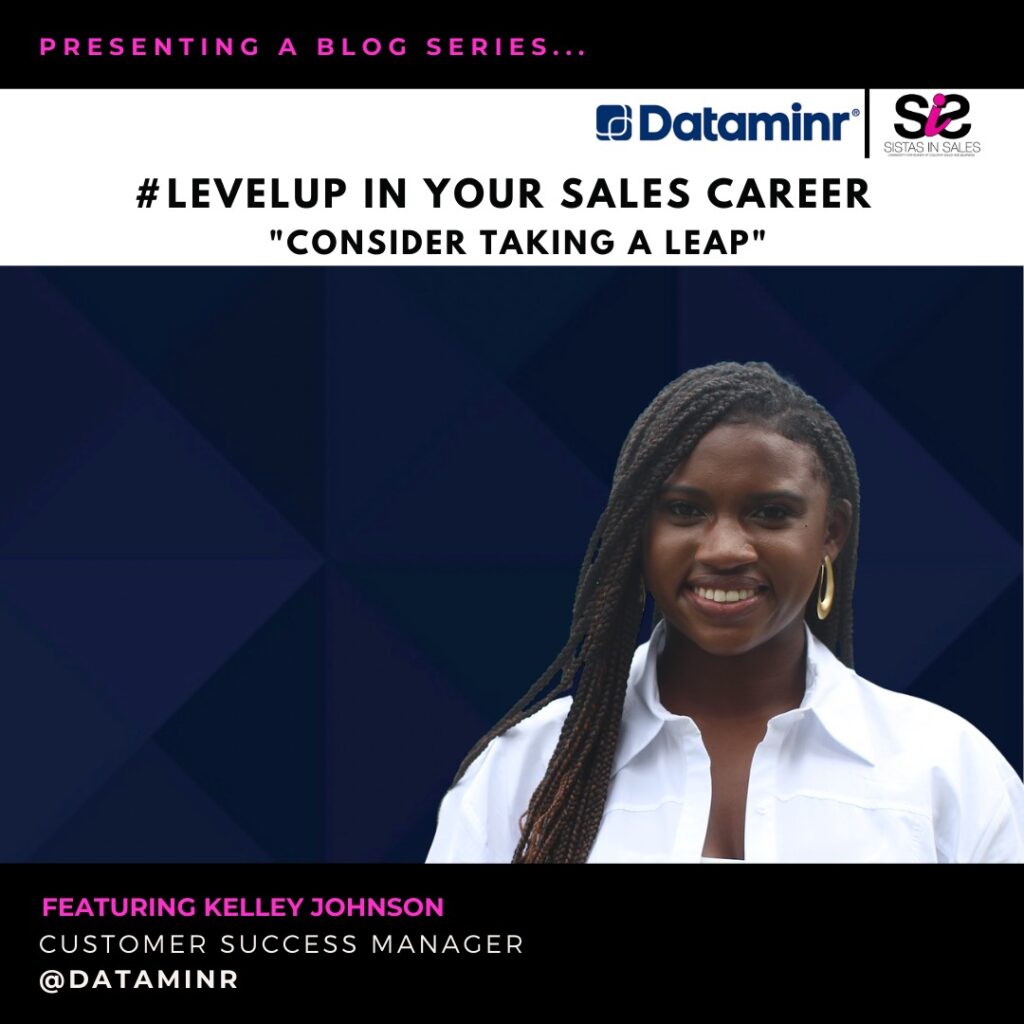
Making the leap into sales from a different field can be daunting. Kelley Johnson, Customer Success Manager at Dataminr, knows that all too well. Kelley is a results-driven manager extracting value from publicly available information, but she didn’t start out that way. Originally working in finance, Kelley made the switch to tech and has never looked back. She has a creative and agile leadership style that cultivates a highly productive and engaging team dynamic. I asked Kelley, what skills do you need to level up, in order to break into and become successful in sales? 1. Be Confident I always say, “don’t second guess yourself.” That’s my biggest advice. As a young Black woman, I wasn’t confident and at times experienced imposter syndrome. To counter this, it was crucial for me to remember my successes, aim to build upon them, and replay them while seeking the next challenge. As with confidence, exuding positivity is just as important. I maintain a positive attitude when engaging with colleagues and customers, and hope that it inspires others. When I started at Dataminr, I was excited to be a part of an entrepreneurial environment where my voice was heard and I was able to make an impact. Although my background was in finance, I was able to apply my client service learnings to my role at Dataminr. 2. Be Curious It’s important to be curious about your customers and their business, but also about the company you work for and what it has to offer. Dataminr’s customers want us to listen to their needs, engage in dialogue, and understand the business challenges they face — but they want us to do so as an informed consultant able to bring our knowledge and assets to the table. Sales success often boils down to connecting customer needs with your company’s capabilities. This means not only being curious, but being a proactive learner and engaging with the right stakeholders. This is also applicable to the world outside the office. Stay on top of current business trends and world affairs, as these things could well be affecting your customer’s businesses, and your familiarity with them could give you an edge in the market. 3. Networking Having a strong network is key. I learned about Dataminr and was referred by one of my mother’s previous interns. Almost every job that I’ve had came through a referral. And sometimes even if your background doesn’t align with the job description, reach out to people on LinkedIn and try to network your way through. Combat the negative thoughts and reach out. Make sure that you have advocates and coaches in your network, both internally and externally, to help you throughout your career. I think that’s huge. I received that career advice from my grandmother. She’s an executive coach and she’s always told me, “if you have a strong network, you can get far.” 4. Relationship Management I think that having strong relationship management is essential because that’s something that you can translate into almost any role. The ability to foster strong relationships with your customers, with anyone that you’re working with on a day to day basis, is important because you want someone to vouch for you when you’re not in the room. And whether they’re vouching for the company, the product, or for you as a person, you want them to be able to say positive things when you’re not there. As a new people manager, I’ve learned that you have to focus on the success of the team rather than yourself. Ensure your team has the tools to reach their personal goals which, in turn, will help me reach my goals. A mission-driven organization is amazing because every day you go in and you know that you’re making an impact, whether it be direct or indirect.” – Kelley Johnson, Customer Success Manager at Dataminr 5. Mission-Driven Organization The COVID-19 pandemic has been challenging over the past year, especially the past two quarters. Believing in the product or platform makes a difference. The work we are doing here at Dataminr is significant. We help customers detect, understand and mitigate risks. We help them get ahead of potential threats to their business. About Kelley Kelley works hard and plays hard to maintain a healthy mind and body. She pursues an active and natural lifestyle, loves a good workout session, and enjoys spending time with her 3-year-old Shih-Poo and best friend, Leo (a cross between the Shih Tzu and Toy Poodle). Whether you are looking to level-up your skills, your career, or your network, Kelley has shown us a successful approach – believe in yourself and take a leap. You may find yourself in an exciting new industry or company. Join us on Wednesday April 28th from 2-3:30 PM to #levelup your sales career with help and insight from savvy, global sales thought-leaders. Register Here – CherilynnChief Learning Officer, SIS Cherilynn Castleman, Global Sales Keynote Speaker/Trainer/Executive Coach, has been a sales executive for 20+ years. With her natural talent for teaching and a drive to sell, Cherilynn uses her skills to coach and train other executives and sales professionals. Author of What’s In the CARDS? 5 Post Pandemic Sales Strategies. Sistas in Sales, LLC (SIS) is a community for women of color sales professionals to network, advance their careers and most importantly, find sisterhood – offering events, thriving Slack community with companies hiring now, and career coaching services. Learn more about Sistas In Sales membership here, connect with us on LinkedIn, Instagram, Facebook, and Twitter. Sponsored by Dataminr Learn more about Dataminr below! Sign up for job alerts
